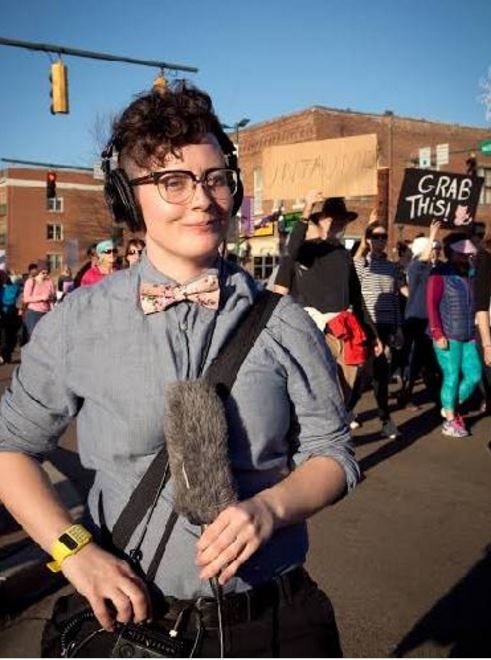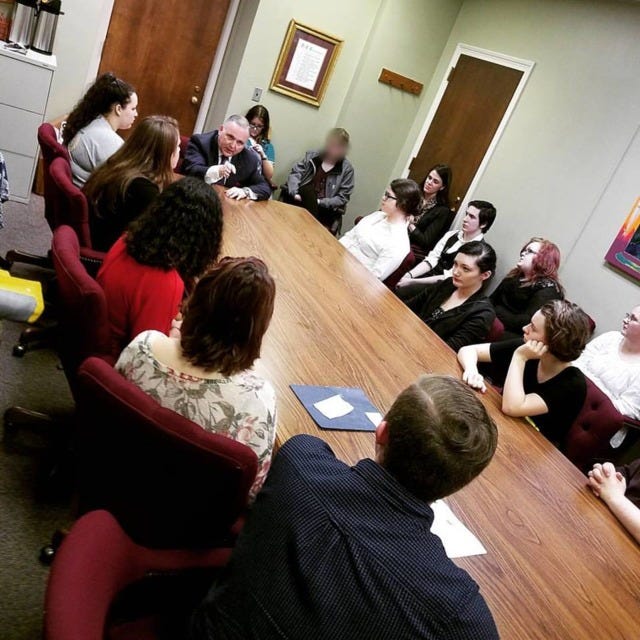A Report on Anti-transgender Lawmakers Got a Public Radio Reporter Fired
Some Tennessee state lawmakers appear to have gotten a public radio reporter fired for a story about their opposition to transgender equality.
Earlier this month, Jacqui Helbert of WUTC, the NPR affiliate at the University of Tennessee at Chattanooga (UTC), accompanied a high school gay-straight alliance from Cleveland, Tennessee to the capitol in Nashville as they spoke with lawmakers who were supporting an anti-transgender bill. That legislation would have required public schools and universities to discriminate against transgender students, but it died in committee last week. It was still, however, a live concern when the students made their visit.
Helbert, decked out in her recording gear, followed the students to the office of Sen. Mike Bell (R), a supporter of the anti-transgender bill. After referencing an unconfirmed report from Breitbart News about a trans woman supposedly raping students in a women’s prison, he said to the students, “Is it how I feel on Monday? I feel different on Tuesday? Wednesday I might feel like a dog.” He went on to reject the legitimacy of transgender identities, calling them “hogwash.” “It’s my DNA. It doesn’t matter what I present myself as. It’s my DNA. It’s science.” Helbert recorded two of the students crying after they left the meeting because of how incendiary his remarks were.
The students also met with Sen. Kevin Brooks (R), who actually said he probably would not support the bill, describing it as “divisive solution in search of a problem.”

After the story ran on WUTC on March 9 and again on March 13, Bell and Brooks both objected to being included. Brooks’ concern was specifically that the comments might make him sound like he supports LGBT equality, which he doesn’t. They claimed that Helbert had not properly identified herself as a reporter during the meetings and that the 32-year-old must have been trying to hide among the high school students. This was despite the fact she was wearing an NPR press pass, headphones, and pointing a 22-inch fuzzy microphone at the lawmakers as they spoke. “I even had to fumble with all my equipment to shake Bell’s hand,” she told the Times Free Press.
Bell complained to the station as well as to some of his colleagues, who happened to be meeting with university officials a week later on unrelated business. At the end of that conversation, Sen. Todd Gardenhire (R), who represents the district that contains UTC, mentioned Helbert’s story, expressing his own “issues with the journalistic ethics of the reporter.” At least one of the lawmakers in that meeting also mentioned the fact that UTC receives funding from the state.
After this meeting, the university fired Helbert and removed her story from WUTC’s site — decisions apparently made without the input of any of the editorial staff at the station, which receives over half a million dollars in support from the university.
Though the article has been officially taken down, it remains archived, so anybody can still listen to it in its entirety.
George Heddleston, senior associate vice chancellor of marketing and communications for UTC, said in a statement that Helbert was fired “based on a violation of journalism ethics.”
Helbert’s termination letter from Heddleston likewise stated, “A review of the matter was conducted and it has been concluded that you did not identify yourself properly as a journalist.”
Nashville Scene talked to Helbert, as well as many of the students she was following, about her actions, how small the rooms were, and how unlikely it was that either lawmaker was unaware of her presence and her recording equipment. Brooks nevertheless insisted, “I have no recollection of anyone who looked like they were recording anything.”

Helbert’s supervisor, news director Mike Miller, was sympathetic to Bell’s concerns, telling her after the lawmaker complained that she had essentially goofed by not publicly stating that she would be recording, but that he otherwise believed she was “doing a great job, and I’m not criticizing you.” Helbert had only been working for the station for six months, having been trained by The Transom workshop, which teaches new journalists about narrative storytelling.
Nashville Scene’s reporting takes issue with UTC’s version of events. At one point, Heddleston seemed to invent a new concern that Helbert had “edited comments from Brooks that seemed to fit her story.” This was never mentioned in any of his actual meetings with her, nor did it come up in his letter of termination. As part if its apparent investigation, the university notably never spoke with the students or teachers who she accompanied to hear their version of events.
Terry Denniston, chief of staff in the chancellor’s office, likewise insisted that the lawmakers did not threaten funding. “At the end of the meeting, funding for the station came up — it was just mentioned, that’s all,” he told the Nashville Scene.
With all this controversy brewing over the weekend, NPR officially weighed in on Monday, defending both Helbert and the station. A statement from Michael Oreskes, senior vice president of news and editorial director, and Mark Memmott, supervising senior editor for standards & practices, made the following points:
- The decision to fire Helbert “was made by university officials, not the news editors at WUTC.”
- The decision to remove Helbert’s story from WUTC’s website was also made by university officials, “not WUTC’s editors.” Oreskes and Memmott link to the archived story.
- Citing Nashville Scene’s reporting, the NPR officials believe “serious questions have been raised about whether university officials were pressured to take those actions by state lawmakers — who could cut state funding to the school and WUTC.”
- “Her mistake was not, her editors say, a firing offense. Instead, it was a learning moment for a new reporter and she was counseled about her mistake. Her editors did not view the story as fatally flawed — she had not hidden her equipment or misled anyone. They say they would not have removed it from WUTC’s website if they had not been ordered to do so. Removing a story — except in the most extreme circumstances — is a breach of the standards practiced by NPR and other credible news organizations.”
- UTC and WUTC should “reach an agreement that ensures the station’s editorial independence in the future.”
So far, the university’s only response has been to defend its intervention, because “the station is part of UTC’s Marketing and Communications division.”
Helbert, on the other hand, told the Times Free Press that she feels vindicated, defending her editors who were “caught in the crossfire” from the university. “They are a scapegoat just like I am,” she said.
Gardenhire, the senator who complained to the university on behalf of his colleagues, accused Helbert of being a “martyr” who “dug her own grave.”
Here again is the link to listen to or read Helbert’s story, complete with the recordings she made of Senators Bell and Brooks.